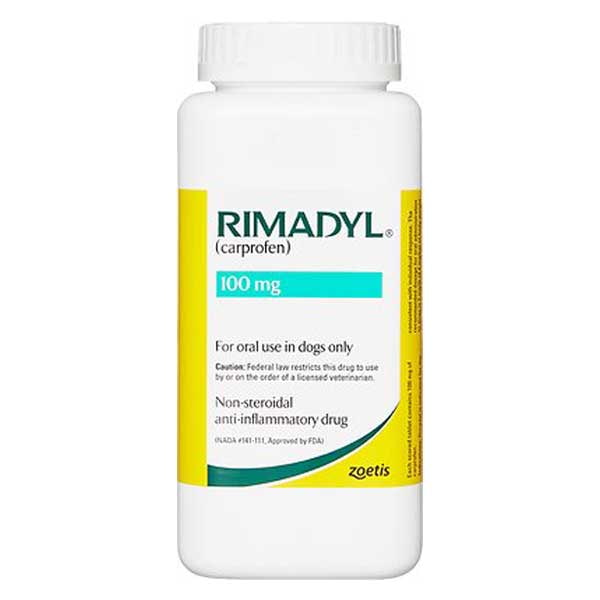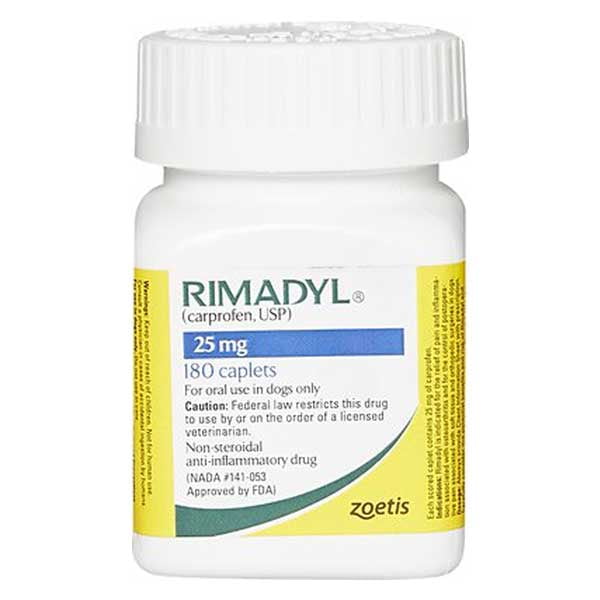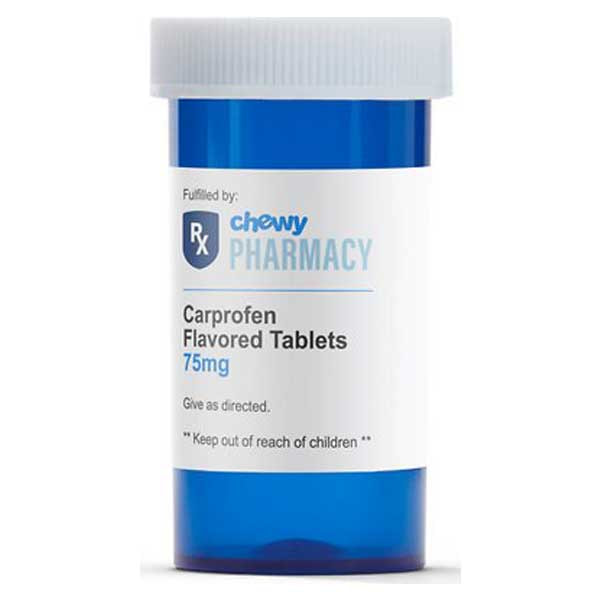When our pets are in pain, we as dog owners want to make sure it is addressed quickly and properly so as not to prolong their discomfort. Whether they are recovering from surgery, have a chronic medical issue, are getting older or just have a general illness we want to make sure they are as comfortable as possible. While your dog can’t always tell you exactly what is physically bothering them, we can often narrow it down through symptoms. A trip to the vet can certainly help sort out the best way to approach a pain issue once there is a good idea of what the central problem is that’s causing it.
While we can sometimes understand where our pups’ pain may stem from, there are other times we only see the symptoms through their mood or lack of ability to function as they normally would. When we as humans have similar pain issues as our pets, we know enough when to take a pain reliever and when to see a doctor. However, its harder to make this decision with our dogs since we can only go by what we observe. We can not jump to an answer for them that we easily understood about ourselves. As dog owners, we need to look more in-depth to discover the reasons for the pain and once that is discerned through their vet then there has to be a discussion about the best medication that suits your dog and their situation. Dogs need to have appropriate meds that are suited to their personal needs, not their owners. While humans may automatically take Advil or Naproxen to work with their pain issues, our dogs will need something different when it comes to brand, dosage, and timing of medication. Rimadyl is a medication that covers this medical area of pain. It is available through their veterinarian and may be prescribed for your dog to help with their pain management.
You can feel confident if Rimadyl is prescribed for your dog as it is FDA approved and is the first drug approved to give to dogs with osteoarthritis. Its safety and treatment success is backed up with over 20 years of science-based research that has heralded over 100 peer-reviewed articles supporting these findings. It is a quality drug that works well without a lot of secondary issues.
What is Rimadyl
Rimadyl, also known as carprofen, is an NSAID. This means it is a nonsteroidal anti-inflammatory drug. Rimadyl and its family of drugs are expected to reduce inflammation in your dogs’ body while having fewer negative side effects that steroidal drugs would have. By having fewer side effects, this means Rimadyl can be used for long term treatment that may be needed when a dog is suffering from a chronic illness that has pain a symptom.

Rimadyl is not only safer than steroidal drugs but also clinically better than ibuprofen, naproxen or aspirin. Its broad-reaching use makes it one of the most commonly used medications when it comes to basic veterinary care that is addressing pain management. Rimadyl is specifically designed for canines and will reduce the chance of there being significant issues that might threaten your dog’s wellbeing if they are simply given human NSAIDs. Human medications do not always translate well in the canine body.
Rimadyl can be given in different forms depending on what your dog’s veterinarian thinks is the best method of delivery in their particular case. Your dog’s veterinarian can help you decide which will work best for your pup while focusing on the pain issue being treated.
Most NSAID medications, including Rimadyl, are used to help ease pain, inflammation, and fever that may be affecting your dog for whatever reason. These drugs work by hindering the enzyme cyclooxygenase through the use of the component salicylate. The cyclooxygenase enzyme creates a material that works similarly to hormones. This is called prostaglandins. When prostaglandin causes inflammation, high temperature, and pain, your pup will often need an NSAID to relieve those issues. While these prostaglandins often need subduing, they can also have some positive effects on the body which your dog still needs. This is part of the issue that your dogs’ vet will be addressing. You don’t want to take away the good while caring for the bad.
The prostaglandins aid in blood movement to their kidneys, create a mucus barrier to protect their GI tract and make sure blood has the ability to clot. All these things are critical to your dog's ongoing health. This means that any medication, such as Rimadyl, that are taken to control the pain issues need to be assessed carefully so as not to ruin the good effects while fighting off the negative. Again, this need to balance the good and bad effects are another important reason your dog’s veterinarian must be involved in choosing a medication and setting its dosing regimen. It is dangerous to simply give a dog a pain reliever thinking there will be no secondary effects.
Rimadyl is a good general pain reliever however, it is generally prescribed by veterinarians for two main reasons. First, it is prescribed for dogs to help with the management of chronic pain that comes with osteoarthritis. Secondly, vets know it is a good medication to help with pain and swelling in a post-operative situation after a dog has had surgery. The reason that it is often applied primarily to these 2 scenarios, is that is treats swelling while reducing pain and fever as well. It may be given in the second instance with an antibiotic to combat a secondary infection, but it will be the Rimadyl that will control the pain. Most dogs don’t have side effects from taking the Rimadyl so it’s a great option for long term use when it comes to the first case which will focus chronic pain management throughout the dog’s life.

With Rimadyl being the first medication approved by the FDA specifically to treat osteoarthritis in dogs, it is important to know how it works. Canine osteoarthritis (OA) occurs in up to 20% of the dogs in the United States. This means over 18million dogs will be stuck with this disease. Many vets say the number is probably higher. Osteoarthritis is a degenerative disease that affects your dogs’ joints causing pain, swelling, stiffness, and issues with mobility. Unfortunately, this disease is not one that goes away. It is chronic so all you can do is manage it and try to reduce its impact on your dog’s life. The disease slowly causes deterioration of their mobility over time by affecting the whole joint that it has targeted. It causes swelling that will not go away and breaks down the cartilage and cruciate ligament making the joint fail. The disease also makes the joint capsule and subchondral bone thicken while reducing the synovial fluid’s ability to help with joint movement. All this will result in the joint space getting smaller and eventually causing pain and mobility problems that can’t be repaired. Without treatments for your dog, like Rimadyl, these problems will cause damage that cannot be rolled back so the only thing left will be further damage or if lucky, the status quo.
The important part of the treatment of osteoarthritis is making sure your dog is comfortable and able to live their life as full as possible. There is also the hope that Rimadyl will slow the progression of the disease to help stabilize your dogs’ comfort. Your vet will want to use Rimadyl in conjunction with other lifestyle changes. They will be making sure your pet is not overweight thus putting extra pressure on their joints and that they are getting moderate exercise to keep mobility high. Without these two changes, Rimadyl will not be able to help your dog on its own. It needs to be a combination of medicine and lifestyle change. It will be important once your dog starts taking Rimadyl that they also increase activity to make sure they keep their muscle strength up and regain some of the mobility and use of their joints if they have lost it in the early deterioration.
The use off all these things is to make sure that your dog gets the chance to break the cycle of inflammation and pain and to slow the disease’s progress.
Rimadyl is one of the most frequently used medications when it comes to post-operative pain. This is the time where your dog may be administered Rimadyl in IV form as it allows more flexibility in dosage and close monitoring of their well being while coming out of the surgery. If the surgery is substantial, your dog may stay at the vet's for a longer period of time allowing the use of the pain killer in a more substantial way. Once they are healing and ready to go home, your dogs’ vet may switch over to caplets or tablets to help do pain management while they are on the mend at their own place. As surgery rarely has to do with chronic pain, your pup will be removed from their Rimadyl prescription once their vet gives them the all-clear and feels that pain management is no longer critical to their comfort and healing.

All drugs that your dog may take over their lifetime, could have potential side effects. Each dog is different and can have reactions that differ from the canine siblings. Rimadyl is no different. While side effects are rare, the drug can have some dangerous ones that an owner needs to watch out for just to be on the safe side. This knowledge is especially important if your dog is taking the drug long term. The most common issues that arise from taking this drug are ones that manifest in their gastrointestinal tract. You need to watch for diarrhea, ulcers, and vomiting as they are all signs that your dog is having a negative reaction to the medication. These side effects can lead to secondary problems if not monitored and corrected.
Other side effects can include liver and kidney issues, but these are rare. However, if they do happen, they can be very dangerous to their health as they are dealing with vital organs. A vet will often make sure that your dog has regular blood work done to make sure the liver is working properly, and enzymes are in the correct range. This is especially important when the dog taking the medication is older or taking the prescription long term.
While the GI issues are fairly evident, there are other side effects that may crop up and need to be monitored or dealt with. You will need to watch for:
While your pup will never have all these side effects, it is important to be aware of them in case one or more should appear. While many of them are not critical, they can signal a deeper issue that may cause serious repercussions on your dog’s health. Knowing that side effects may be a possibility is good for the safety and care of your dog.
Rimadyl is a closely monitored prescription given to your dog by their veterinarian. While it's not a medication that is under scrutiny or known for overdoses, its side effects from taking too much can be problematic especially when they involve the liver and kidneys. Rimadyl dosages will be managed according to the reason your dog needs it, whether it is long or short term, the weight and age of your pup and any other medications or health issues that might interfere with its positive use. Once these things are all considered then your dogs’ vet can choose the best form of the prescription for your pup.
There are 4 ways your dog can take Rimadyl and that is by chewable tablet, caplet, chewable caplet or injection. The first three can be given at home but the one that is an injection is only given by your dog’s veterinarian. The tablets and capsules are given once or twice daily depending on what the vet thinks is for your dog’s particular pain issue. They can be chewable or not. The injectable form of Rimadyl is mainly for veterinarians to give as a pain killer after your dog has surgery. This can not be done at home as its properties are stronger and need supervision as your dog may be on other medications as well.
If you decide to buy the unflavored tablets and capsules you might need to purchase pill pockets to help get your dog to take them as chances are they aren’t going to do it on their own. Without a tasty flavor added to the medication, chances are eating it won’t be overly enticing for your pup. Choosing a method of administering the medication that gets it into your dog quickly and that rescues you from battling with your pup to take the meds is the best way to go and the least stressful for both of you in the long run.
Product Image | Product Name | Buy Now |
|---|---|---|
Rimadyl (Carprofen) Chewable Tablets for Dogs | ||
Rimadyl (Carprofen) Caplets for Dogs | ||
Greenies Pill Pockets Canine Hickory Smoke Flavor Capsule Dog Treats | ||
Carprofen (Generic to Rimadyl, Novox, Vetprofen) Flavored Tablets for Dogs |
Final Thoughts
When Rimadyl is prescribed for your dog, you will know that it is a quality medication that will work well in targeting your dogs’ pain whether it is a one time issue or a chronic medical problem. The fact that it is FDA approved means you can be comfortable in administering it to your pet as long-time support or ongoing pain management. It will help relieve pain issues stemming from the surgery, injuries or even illness where aches and fevers are involved. While Rimadyl is a well known and trusted medication, it is still important to spend time with your dog’s veterinarian to make sure the pain is being addressed properly and not just covered up. Pain is a symptom that will have an underlying cause that needs to be assessed and treated while addressing pain management as well.
Your vet, after finding the root cause of the pain, will then be able to offer not only a prescription for Rimadyl but assess the proper dosage and timing for your dog so you can administer it properly for the best results. Their vet will be able to look at poor drug interactions and long term impact so your dog will be well monitored and taken care of. While pain management often seems to be one of the easier medical issues to deal with, it is often more complicated than it seems and needs to be properly addressed if your dog is to feel comfortable and healthy.









